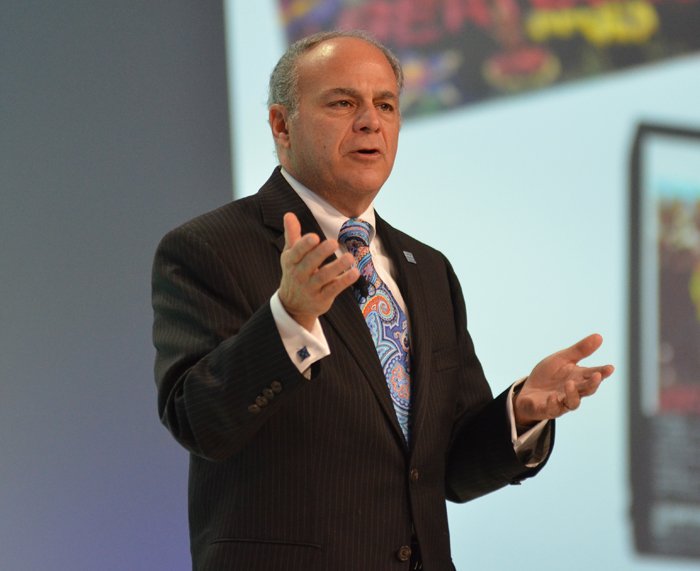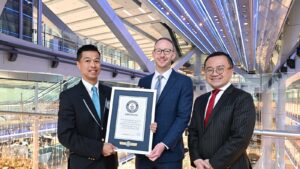BOSTON— Robert A. Kerzner, CLU, ChFC, president and CEO of LIMRA, LOMA and LL Global, opened the 99th LIMRA Annual Conference in Boston on Oct. 25, examining the potential disruption facing the financial services industry and how companies can respond and thrive in this new world order.
“Technology can be a disruptor or an enabler ─ websites like Google Compare and Policy Genius make price the top driver for consumers,” said Kerzner (shown at right). “For some companies these sites represent an unwelcome disruption while others are leveraging these sites to enter new markets and reach new customers.”
Kerzner highlighted the impact commoditization can have on an industry and noted that to avoid it, companies need to differentiate themselves through innovation, service or segmentation. Citing examples like John Hancock’s partnership with Vitality, Mass Mutual’s Society of Grownups and Protective’s relationship with Costco, Kerzner pointed to the importance of building long-term, ongoing relationships with consumers.
“The rise of the consumer is having a tremendous impact on every industry,” stated Kerzner. “Consumers have more choices and more power to determine how and when they access information. We need find ways to be where they are in their day-to-day lives.”
According to LIMRA research, 41% of people shop for life insurance as a result of life events, like getting married, buying home or having a child. Kerzner suggested insurers find ways to connect with consumers during these life events. He speculated that companies could engage new parents at the hospital through kiosks, educating them about the importance of life insurance to ensure their family’s financial security.
Kerzner also discussed the growing robo-advice market and how it will impact today’s advisors. “Will producers be disintermediated? No, our research demonstrates that people still want advice from a person,” he said. “But the model will change and advisors will need to leverage more of the tools and technology available to meet consumers’ expectations. Companies too will have to shift their strategies, building platforms and relationships that attract consumers to seek the advice in new ways.”
Kerzner ended his remarks discussing the most imminent disruptor of the financial services industry: the Department of Labor’s proposed fiduciary rule. He pointed to LIMRA Secure Retirement Institute research that illustrates the positive impact using an advisor has on retirement savings rates and retirement planning.
“In the next 10-20 years, there will be an unprecedented shift of assets as the majority of Boomers enter retirement. It is likely their financial goals also will shift from accumulation to principal protection and income generation. They will need help to achieve those goals,” noted Kerzner. “Our research indicates that people are more likely to save and plan for retirement when they work with an advisor. It seems clear that this is just the beginning of an effort to limit how we can serve people who are trying to get the financial advice they want and need.”
The LIMRA 2015 Annual Conference’s theme, “Pivot Point: Striking a Path for Success,” focuses on the challenges and changes affecting the financial services industry. The conference brings together leading experts and company executives to examine today’s most important issues, and to revisit, and possibly rethink, the ideas that have informed the industry’s strategies and tactics to date.
More than 500 senior leaders from life insurance and financial services companies worldwide attended the industry’s most prestigious meeting.
Executives share candid thoughts and insights in panel session
Three life insurance CEOs joined Kerzner for a candid discussion during the annual conference on Monday, sharing their perspective and insights about the future of the industry.
Roger W. Crandall, CFA, chairman, president and chief executive officer, Massachusetts Mutual Life Insurance Company; Donald A. Guloien, FLMI, president and chief executive officer, Manulife; and Walter White, president and chief executive officer, Allianz Life Insurance Company of North America, participated in a thoughtful, provocative round table that covered everything from the Department of Labor’s proposed fiduciary regulation to distribution hurdles, the impact of technology and changing consumer expectations.
All three panelists acknowledged the Department of Labor’s fiduciary regulations were the most formidable threat to the life insurance industry. Crandall said they will constitute “the biggest change to the industry since ERISA in 1974.” White said that while it’s easy to see the downside for the industry and for customers’ ability to receive low-cost advice, he’s hopeful the end result will be a newfound importance placed on the value of financial advice. “We’ll get through it,” added Crandall.
Guloien, who has managed a slew of mergers and acquisitions at the helm of Manulife, said his goal has always been to get more people covered by life insurance and to find “new ways of distributing our great products all over the world.”
A predominant theme among the panel was change and how the industry is responding to it. Walter White acknowledged that “a confluence of forces is coming together and we have to acknowledge the new reality.”
All three discussed how technology is changing everything from product development to consumer engagement and distribution. White shared how his company was testing new product designs directly with consumers to build better products. Guloien discussed the success of John Hancock’s partnership with Vitality, highlighting how it has “redefined our relationship with the consumer.” Crandall, who cited LIMRA research that life insurance ownership is at a 50-year low, said “We have a moral obligation” to try new things and make investments for the future to reach more Americans.
Robo-advisors, which LIMRA estimates will manage approximately $2 trillion in assets by the end of the decade, were another hot topic, with Guloien calling them “overhyped” and dismissing the idea they could replace traditional advisors. He said they will become part of the landscape but won’t fundamentally alter it. All three panelists agreed that robo-advisors are but one of the industry changes that they will have to get ahead of or risk falling behind.
White said the industry “has a sense of purpose,” and that sense will sustain the financial services industry through whatever the future may throw at it.
Even still, stiffer regulations, continued low interest rates, distribution challenges, longevity and cyber security remain prominent roadblocks. Crandall, Guloien and White acknowledged that times have changed, but they’re undeterred and confident as they face the future.
About LIMRA: LIMRA, a worldwide research, learning and development organization, is the trusted source of industry knowledge, helping more than 850 insurance and financial services companies in 64 countries increase their marketing and distribution effectiveness. Visit LIMRA at www.limra.com.













